Consistency Is Your Friend
Note: None of the following is set in stone. This is merely a way to start discussion on some issues with syntactic inconsistencies in Corinna.
Years ago I was working with some graphing software where points would be declared via:
var point = point(2,3);
Except that the point function took Y,X as arguments, not the near
universally-accepted X,Y. To this day, I loathe the author of that library
for making my life hell.
On a more personal note, while building Tau Station —a narrative sci-fi MMORPG—I was trying to respect proper separation of concerns and not building god objects, so when it came time to check if an NPC has a mission for a character, I had this:
if ( $missions->has_mission_for( $character, $npc ) ) {
...
}
Or was it this?
if ( $missions->has_mission_for( $npc, $character ) ) {
...
}
To this day, I cannot remember which style I used and what justification I had
for that, but it was a constant source of bugs because I kept getting the
$npc and $character swapped. So I bit the bullet and decided that, as much
as possible, Tau Station code would follow SVO (subject-verb-object) syntax,
instead of the weird “context-verb-subject-object” I had created. Or was it
“context-verb-object-subject”? Who knows? Instead, the above became this:
if ( $npc->has_missions_for($character) ) {
...
}
And now the meaning of the code is crystal clear, though people will complain about “God objects” (which I address here ).
Consistency brings clarity. Reasoning about code is hard enough when it appears to be an ad-hoc mishmash of rules.
So, um, that brings us to the Corinna project , my attempt to bring modern object-oriented programming to the Perl language.
Language Design
As I’ve previously pointed out, my first foray into language design didn’t go as well as I hoped. At its heart, you can think of language design as consisting of three parts:
- Semantics
- Syntax
- Community
I mostly had the semantics and syntax down, but I hadn’t done a great job of paying attention to the community. The community feedback was mixed, to put it politely. So an IRC channel was created (irc.perl.org #cor) and a github project was started and anyone with an interest in the project was welcome to share their thoughts.
By including the community, we’ve done a fantastic job of turning Corinna from an interesting sideshow to something that is (mostly) popular with the Perl community. If we can bring her over the finish line, we have something that is likely to be included in the Perl core as an experimental project. You have to ask for it by name:
use feature 'class';
class Foo {
...
}
And then you get all the lovely OO goodies in a powerful, declarative syntax.
We’re soooooo close to being able to propose an RFC that I am loathe to throw a wrench in the works, but I must. I must because Kim is very, very unhappy with Corinna.
Who the Hell is Kim?
Please note that much of this is largely derived from emails I’ve swapped with Damian Conway . I’ve rewritten it considerably, but the core of this is him noting inconsistencies that have been discussed on the IRC channel, but not put together conherently. Corinna has evolved with some serious inconsistencies and the time to consider fixing them is now, not after it’s released.
Corinna, as some of you may know, was chosen as the name of this project because my nom de guerre, is “Ovid” and he wrote poems to Corinna, a love interest (if you’re familiar with the poetry, you know I’m keeping this family-friendly). Kim isn’t jealous of Corinna. She’s furious because Corinna, after literally years of design, is breaking some cardinal rules of consistency. So, let’s dig into that.
So let’s look at the way we declare things in Perl. In particular, we’ll look
at my variables, subroutines, and packages.
my $answer = 42;
sub douglas_adams { ... }
package Restaurant { ... }
Those all seem different, but we start declaring what type of thing we have: a variable, a subroutine, or a package. Then we follow that up with the name of the thing, followed by the optional set up of that thing.
But what if we want to modify how those things behave? Attributes have been
alternately proposed and rejected by many developers, but if you use
threads::shared in Perl, you can declare a variable as shared across
threads:
my $answer :shared = 42;
What if you want to declare a subroutine as an lvalue?
sub douglas_adams :lvalue {...}
Or declaratively state the version of a package without using the procedural
$VERSION assignment?
package Restaurant v3.1.4 { ... }
In fact, if we continue down this road, we see a pattern start to emerge:
| keyword | identifier | modifiers? | setup? |
|---|---|---|---|
| my | $lexvar | :shared | |
| our | $packvar | :Tracked | = 0 |
| state | $statevar | :Readonly | = 1 |
| sub | action | :lvalue | () {...} |
| package | Namespace | v1.2.3 | {...} |
| format | Report | = ... . |
KIM stands for “Keyword”, “Identifier”, and “Modifier” (yes, it should be “KIMS”, but I like the “Kim versus Corinna” description. Sue me.)
Kim likes consistency. You must always declare the kind of thing you’re going to use and then name it. You can then optionally modify its base behavior and then optionally set it up. Very, very consistent:
KEYWORD IDENTIFIER MODIFIERS SETUP
Of course, you can point to plenty of areas where Perl is not consistent, but Corinna is designed to improve the Perl language, not add to the inconsistency, so let’s look at a few examples:
| keyword | identifier | modifiers? | setup? |
|---|---|---|---|
| role | Tracked | {...} | |
| class | Root | {...} | |
| slot | $msg | :param | |
| slot | $handler | :handles(exists delete) | = Handler->new; |
| slot | $size | :reader :param | = 100; |
| slot | $created | :reader | = time; |
| method | is_root () | {...} | |
| method | obj_count | :common () | {...} |
| method | insert | :private ($key,$value) | {...} |
| method | show ($msg) | {...} | |
| method | obj_count | :overrides :common () | {...} |
So that’s actually looking pretty good. Corinna is developing with a clear, consistent KIM syntax. But if that was all, this wouldn’t be a helpful article. That’s the good; it’s time to look at the bad. And maybe the ugly.
This Ain’t Kim
Let’s look at a few examples of inconsistencies. We’ll start with putting the modifier first.
| modifier | keyword | identifier | setup |
|---|---|---|---|
| abstract | class | Counter | {...} |
And let’s mix up keywords and modifiers.
| keyword | identifier | keyword as modifiers | setup |
|---|---|---|---|
| class | Handler | isa Counter does Tracked | {...} |
Let’s use modifers plus keywords plus identifiers plus modifiers plus ...
| modifier | keyword | identifier | modifiers | setup |
|---|---|---|---|---|
| before | method | obj_count | :overrides :common () | { warn “Counting...“; } |
| after | method | obj_count | :overrides :common () | { warn “...done”; } |
| around | method | obj_count | :overrides :common () | { return 1 + $self->$ORIG(); } |
So, yeah. Damian pointed all of this out to me and he’s right. Corinna is close, but there are syntactical inconsistencies which, if agreed that they should be addressed, should be addressed before an RFC, not after.
Turning Corinna into Kim
The name’s still Corinna, but she needs KIM.
When I started converting Tau Station code to (in)consistently use SVO syntax, it made it much easier to maintain. Doing the same thing with Corinna is worthwhile.
So, how do we address all these inconsistencies? Corinna semantics are OK. We just need some tweaks to the syntax.
| keyword | identifier | modifiers? | setup? |
|---|---|---|---|
| class | Counter | :abstract | {...} |
| class | Handler | :isa(Counter) :does(Tracked) | {...} |
| method | obj_count | :before :overrides :common | () { warn “Counting...“; } |
| method | obj_count | :after :overrides :common | () { warn “...done”; } |
| method | obj_count | :around :overrides :common | () { return 1 + $self->$ORIG(); } |
And here’s a slightly modified example from Damian showing this more consistent syntax:
role Tracked {
slot $msg :param;
method report () { $self->show($msg++) }
method show; # required
}
class Root {
method is_root () { return 1; }
}
class Counter :abstract {
slot $obj_count :common :reader = 0;
ADJUST { $obj_count++ }
DESTRUCT { $obj_count-- }
}
class Handler :isa(Counter) :does(Tracked) {
slot $handler :handles(exists delete) = Handler->new;
slot $size :reader :param = 100;
slot $created :reader = time;
ADJUST { croak("Too small") if $size < 1; }
DESTRUCT { $handler->shutdown; }
method insert :private ($key, $value ) {
if ( ! $self->exists($key) ) {
$handler->set( $key, $value );
}
}
method show ($msg) { say $msg; }
method obj_count :common :overrides () { $self->next::method() - 42; }
method obj_count :common :before () { warn "Counting..."; }
method obj_count :common :around () { return 1 + $self->$ORIG(); }
method obj_count :common :after () { warn "...done"; }
}
Conclusion
As you can see from the sample code, this still looks like Corinna. We have the semantics and syntax, but do we have the community? The changes aren’t huge, but they might prove controversial because Corinna would again be changing. But I think it’s changing for the better. Further, by establishing the KIM principle now, further upgrades to the Perl language can have guidance on maintaining consistency.


